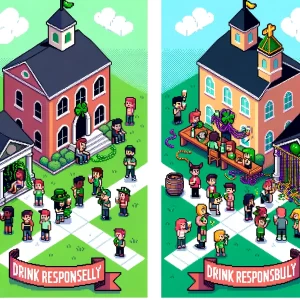
Enhancing Treatment Accessibility for Problematic Alcohol Use: Same Old Story
Alcohol use is a leading cause of global disease and disability, yet many who need treatment for problematic alcohol use (PAU) don’t seek it. The reasons are complex, and understanding the barriers and facilitators to treatment is crucial. The recent scoping review titled “Service-level barriers to and facilitators of accessibility to treatment for problematic alcohol use: a scoping review” delves deep into these issues.

Before I jump in I should mention that I was a substance abuse counselor in Philly about two decades ago. It was absolutely incredible work, with absolutely incredible staff and clients.
And yet, as I read this—”it’s the same freaking story.”
What’s the Issue with Treatment Accessibility?
The review systematically maps out characteristics of services for treating PAU that act as barriers or facilitators from the perspective of individuals with PAU. The study, which delves into qualitative research and surveys from various sources, aims to identify modifiable characteristics of PAU treatment services. These insights are vital to improving service design and policy reform, contributing to more accessible and effective treatments.
I want to briefly qualify that this study pulled from Canadian providers.
Key Findings: Barriers to Treatment
The review identifies several unique service-level barriers, including:
- Complex Navigation: Lack of a clear entry point and fragmented treatment pathways make accessing services difficult.
- Financial Costs: High treatment costs and insurance coverage issues are significant barriers.
- Cultural Sensitivity: Services often lack cultural and demographic sensitivity.
- Anonymity and Privacy: Fears of stigma and loss of privacy prevent people from seeking help.
- Geographical Accessibility: The lack of local treatment options and inconvenient appointment hours hinder access.
Key Findings: Facilitators of Treatment
On the flip side, certain facilitators were identified that could potentially improve access, such as:
- Telehealth Options: Modified treatment delivery to embrace telehealth options, especially noticeable during the COVID-19 pandemic.
- Cultural Adaptability: Services that are sensitive to cultural, demographic, and individual needs.
- Clear Information: Improved dissemination of information about available services.
Implications for Public Health Practitioners
Understanding these barriers and facilitators is crucial for public health practitioners to design and implement more accessible PAU treatment services. Interventions could include policy reforms focusing on reducing financial barriers, enhancing service navigation aids, promoting cultural competency in treatment services, and leveraging telehealth. Collaborating with communities to understand and address these barriers can also lead to more effective and accessible treatments.
Conclusion: A Call for Informed Action
The comprehensive understanding provided by this scoping review is a stepping stone towards creating more accessible and effective PAU treatment services. Public health practitioners can significantly improve treatment engagement rates by addressing the identified barriers and utilizing the facilitators. The original article is a rich resource for anyone committed to improving healthcare accessibility and efficacy in treating problematic alcohol use.
And yet,
Come on. Let’s do better.
Elevate Your Insight with Every Issue!
Ignite your journey as a public health change-maker through ‘This Week in Public Health.’ Each edition draws you nearer to the pulse of community health, pioneering research, and advocacy. Beyond mere news, it’s your catalyst for transformation. Become a part of our community of enlightened individuals dedicated to driving positive change in public health every week – subscribe for free now!



